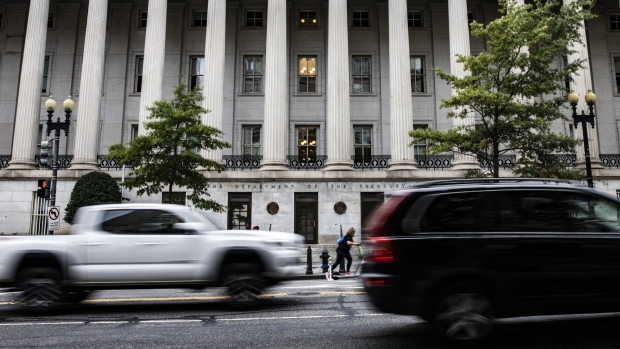Oct 6, 2021
Ugly U.S. Debt-Ceiling Drama to Gin Up Treasuries’ Haven Appeal
, Bloomberg News

(Bloomberg) -- The U.S. debt-ceiling impasse has unnerved investors around the globe. While a dire outcome of a default could send shockwaves throughout markets, the irony is that Treasuries might actually do well in this case.
“Could you see a safe-haven flight into the very thing that’s causing the issue? Yes, I definitely think it could play out that way,” said Margaret Kerins, head of fixed-income strategy at BMO Capital Markets. “It would be about what are the implications for other markets, with global risk markets not liking it if we got into a technical default situation. You’d have a run to the Japanese yen as well.”
That would be similar to what happened back in 2011, when S&P downgraded the U.S. from AAA, slamming the nation’s political process and criticizing lawmakers for failing to cut spending or raise revenue enough to reduce record budget-deficits. The decision hit global investor confidence -- erasing about $2.5 trillion in the value of global equities, lifting gold to a record and spurring a rally in Treasuries.
Unrelenting Political Brinkmanship Edges U.S. Closer to Default
A JPMorgan Chase & Co. study last month showed that for particularly contentious debt-ceiling debates -- such as in 2011, 2013, and 2015 -- when legislation was passed only days before a potential technical default, 10-year Treasury yields actually fell.
For now, investors are currently shunning bills -- the shortest maturity of the U.S. debt curve -- that come due around Oct. 18, the date cited by Treasury Secretary Janet Yellen for when the government is poised to run out of money. Yet debt-ceiling angst may give a bid to Treasury notes and bonds -- which have been underwater in 2021 -- with benchmark 10-year yields hovering around 1.52%.
Kerins’s base-case scenario, though, is that policy makers won’t let the “unimaginable” happen of going over the cliff and allowing the U.S. to default.
Democrats and Republicans must decide in the next day or two how far to take their deadlock over the U.S. debt limit. Senate Majority Leader Chuck Schumer will force a vote Wednesday on whether to take up a measure suspending the nation’s debt ceiling until December 2022. Republicans, as they did the last two times, promise to block him. Fitch Ratings recently warned that its U.S.’s AAA sovereign rating could be at risk if Congress fails to raise the federal debt limit.
“Long-term Treasuries rallied in a huge way in 2011, and we suspect you’d have a similar move this time to a lesser degree if things get down to the wire,” said Zachary Griffiths, strategist at Wells Fargo & Co. “Further out the yield curve, in most notes and bonds, nobody would be concerned about the actual solvency of the U.S. government.”
©2021 Bloomberg L.P.


